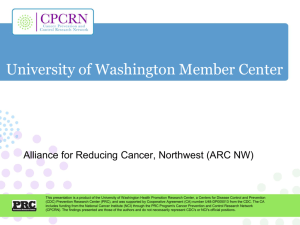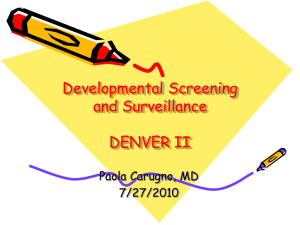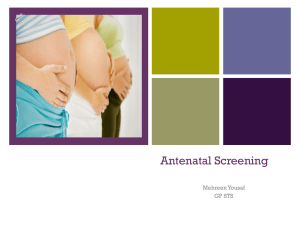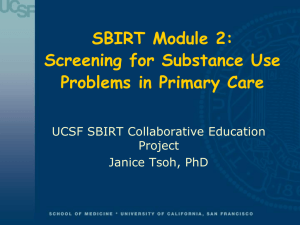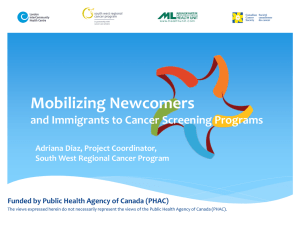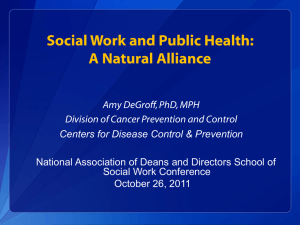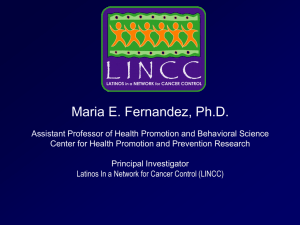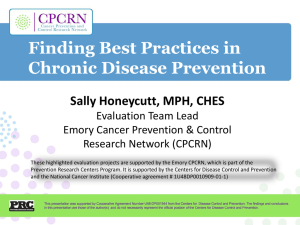Karen Glanz – U Penn Presentation
advertisement
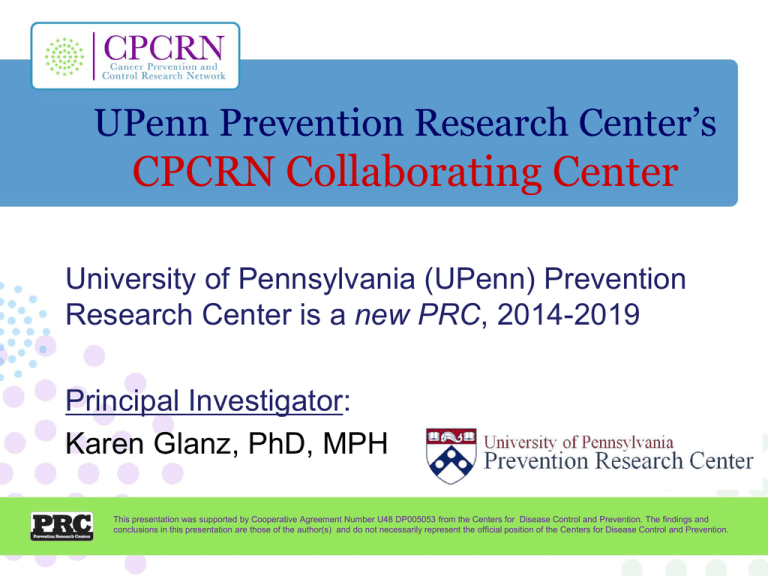
UPenn Prevention Research Center’s CPCRN Collaborating Center University of Pennsylvania (UPenn) Prevention Research Center is a new PRC, 2014-2019 Principal Investigator: Karen Glanz, PhD, MPH This presentation was supported by Cooperative Agreement Number U48 DP005053 from the Centers for Disease Control and Prevention. The findings and conclusions in this presentation are those of the author(s) and do not necessarily represent the official position of the Centers for Disease Control and Prevention. Background Purpose of the CPCRN: to work with partners to accelerate the implementation of evidence-based cancer prevention and control in communities Context of our CPCRN Collaborating Center: • UPenn PRC focus: community-based chronic disease prevention and reducing health disparities in Southeastern Pennsylvania • Deeply involved with the Abramson Cancer Center (ACC) at the University of Pennsylvania • We have worked on & are involved with relevant community organizations including state and local health departments and federally qualified health centers. Specific Aims 1. Establish and maintain the infrastructure within the UPenn PRC to lead and manage a program of community-based intervention research in cancer prevention and control. 2. Form and expand partnerships to advance community-based intervention research in cancer prevention and control in Southeastern Pennsylvania (SEPa) and the surrounding region. 3. Expand community-based dissemination and implementation research on cancer prevention and control in SEPa and the region, including the state of Pennsylvania, through the use of: a) Evidence Academies and b) A Community-Engaged Scholars program of collaborative pilot grant funding. Planned Research Aim Address critical gaps in the uptake of evidence-based strategies to increase colorectal cancer screening - by conducting implementation research to increase systematic and opportunistic screening for colorectal cancer in primary care settings - especially for disadvantaged and minority adults Our Team Karen Glanz, PhD, MPH (PI) • • • • • PI of the Emory University PRC and CPCRN Network Center from 2004 to 2009 Director, Community Engagement & Research Core, UPenn CTSA Director, Recruitment – Outcomes Core (ROAR), Abramson Cancer Center Co-Chair, Implementation Sciences Working Group, 2012-2013 Member, Community Guide Task Force Chyke A. Doubeni, MD, FRCS, MPH • • • • Presidential Associate Professor of Family Medicine and Community Health, and Associate Professor of Epidemiology (Multiple) PI, PROSPR Network (CRC screening improvement) HMO Research Network CRC Screening, quality of screening, health disparities Our Team (cont’d) David T. Grande, MD, MPA • • • Internist, health policy researcher Making improvements to the health care safety net in Philadelphia FQHC’s, emerging healthcare delivery/technology, reimbursement, access to care Carmen E. Guerra, MD, MSCE • • • Associate Director of Diversity and Outreach, ACC Cancer screening research, vulnerable populations, navigators Active in regional & state cancer organizations and public health John R. Kimberly, PhD (Wharton School) • • Organizational behavior, health care management, implementation science Chair, Implementation Sciences Working Group, 2011-2013 Cathy Melvin, PhD, MPH • Consultant (MUSC) Ideas/Projects Access to care and cancer screening in FQHC's under the Affordable Care Act • • • • Multiple costs and influx of new patients Lines between free screenings and deductibles Affect on screening utilization and use of evidence-based interventions to promote screening Collaboration to study and identify ways to improve screening in lower-income populations Why a Network Project? • • Healthcare markets are heterogeneous, states have varied policies, and hard to do a strong study in a single institution or geographic area Results would be more impactful with cross-center network collaboration Ideas: Cross-Center Projects Cervical cancer screening: Implementation of new guidelines • • • New Cervical Cancer screening guidelines were released by the USPSTF and other professional groups in 2012 Potential for de-escalation of intensity and frequency of screening, do-it-yourself home testing, HPV testing combined with Pap tests, and changing clinical practices Study of the implementation of new guidelines could be timely and important Why a Network Project? • • • CPCRN collaborating centers have relationships with different types of healthcare institutions and clinics A multi-center study on this topic would be stronger than one conducted in a single institution or geographic area Results of a "starter" cross-center network collaboration on this topic could rapidly lead to a larger implementation science study Questions, Comments
